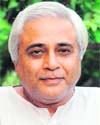|
Punjabi
antenna
Channels pull
their punches
Randeep Wadehra 
EVER since 1950s
when television arrived on the global scene as the latest
purveyor of news and views, many paradigm shifts have taken
place in the world of journalism. If it was the Vietnam war and
Watergate in the USA that brought out media’s role as
conscience keeper in stark relief then, in India, too, it has
been quite active in exposing crime in high places.
In the case of
Punjabi television, although it has been reasonably efficacious
as watchdog, its attempts at becoming an arbitrator between the
government and the governed have not been so impressive.
Perhaps, the most
striking example has been Lok Bani of PTC News,
which was doing a great job as an interface between the various
government agencies and aggrieved people in Punjab’s villages
and small towns. Regrettably, later on, the channel changed its
format and concentrated on soft-focus interviews.
But there is this
nagging feeling that the law of diminishing marginal utility has
set in as far as media-as-watchdog is concerned. For example, a
police constable in Batala grabs his relatives’ land.
|

Channels do a good job as an interface between government agencies and aggrieved people. However, they later switch on to soft interviews
|
When ordered by
the court to vacate the land so usurped, he manages to thwart
the order’s implementation. PTC News highlighted the case. If
you thought this would have led to prompt implementation of the
said orders, perish the thought. But this is not the only case
where the law has been flouted with impunity despite the news
television having highlighted such malfeasance.
There were news
reports of powerful politicians preventing the demolition of
shops in Ludhiana despite court orders.
Even the much
reported Shera murder case languishes in Punjab & Haryana
High Court’s case files. Clearly, the news channels have been
less than effective in facilitating the implementation of the
country’s laws. Who is to blame, the extant
superstructure of governance or the tepid public opinion?
Perhaps the rot is much deeper and widespread.
However, there are
other cases, such as pursued by Day & Night News that has
been reporting "quid pro quo between ex-policeman Surinder
Pal Singh and the Badals." Similarly, the channel has been
going after Sumedh Singh Saini, highlighting misuse of power by
this senior cop. Although the channel has been citing various
court cases and legal experts/social activists, one cannot be
sure that the wheels of justice will begin to move anytime soon.
Why has Punjabi
television failed to take various campaigns for justice and
reforms to their respective logical conclusions? The reasons are
obvious. There is no basic unity of ethics amongst the competing
news channels. One can understand ideological differences but to
give news content slants to please specific political masters
has resulted in creating doubts about their credibility.
On 30th
of April Masle of PTC News took up the case of Pakistani
nationals who have sought asylum in India on humanitarian
grounds. Most of the viewers were not even aware of this
lingering, sad saga of people in the no man’s land. They
comprise a few hundred Hindus from Pakistan who fled their
homeland to seek solace in the liberal, democratic and secular
India. However, although they are happy to be here, the local
police and bureaucracy do not take kindly to their presence. All
their efforts to get Indian citizenship are being thwarted on
one ground or another.
Their tales are
heartrending. "Back home" they were not allowed to
perform the last rites of their dead and had to travel more than
150 km to conclude the antim sanskaar. If this is the
fate of the dead, one can imagine what the living among the
minorities must be enduring there. But despite Avinash Rai
Khanna’s intervention, would the powers that be in New Delhi
do the right thing and ameliorate their ordeal?
|